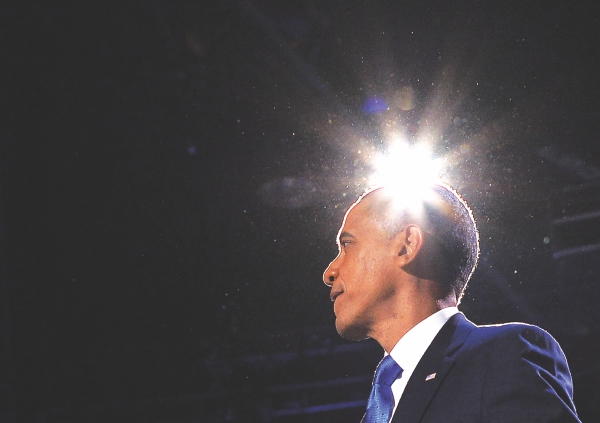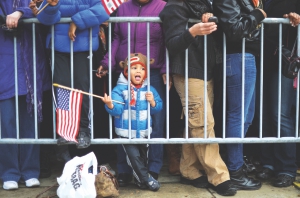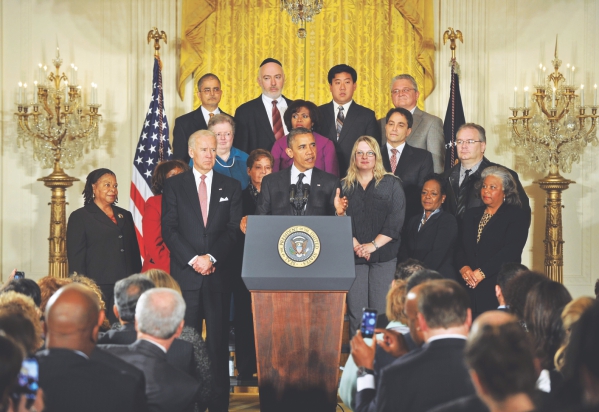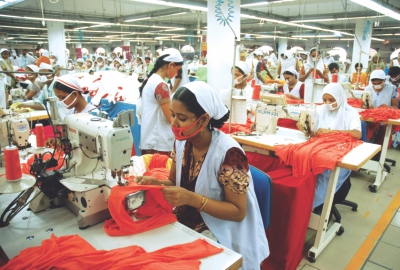| Home - Back Issues - The Team - Contact Us |
 |
| Volume 11 |Issue 45| November 16, 2012 | |
|
|
Cover Story
American Dreams Moving Forward?? Soraya Auer “America, I believe we can build on the progress we've made and continue to fight for new jobs and new opportunity and new security for the middle class. I believe we can keep the promise of our founders, the idea that if you're willing to work hard, it doesn't matter who you are or where you come from or what you look like or where you love. It doesn't matter whether you're black or white or Hispanic or Asian or Native American or young or old or rich or poor, able, disabled, gay or straight, you can make it here in America if you're willing to try.” It was the longest and most expensive election campaign any democracy has ever seen. The world watched in great anticipation as the tight race between America's first black President Barack Obama and Republican rival Mitt Romney came to an end last week. People queued for hours at polling stations to exercise their right to vote and the results saw the United States re-elect the incumbent Democrat for a second term in the White House. No US president had won a re-election with a weak economy and unemployment at a 7.9 percent high. The Republicans were so confident of winning that the Romney campaign bought $25,000-worth of fireworks and prematurely launched their 'transition to Presidency' website. Exit polls now tell us that, as in the 2008 election, Obama was propelled into the presidency thanks to women, young voters, and ethnic minorities.
In light of the hype and excitement that rippled across the world, the Star spoke with American Bangladeshis and Bangladeshi immigrants living in the US, some of whom threw 'Obama Victory Parties', on why they supported Obama and why they believe the Democrats represent their hopes and ideals. “We've always been Democrats,” says Sharmin Khan, a lecturer of Linguistics at San Jose State University, who lives with her Bangladeshi-born family in California's Bay area. “I voted for the first time in 1996 for Clinton's second-term because the Democrats were immigrant-friendly and the most inclusive party. Their policies appeal more to liberal, open-minded, secular people compared to the Republicans who are seen as a war-loving, tax-cutting party.”
Hasanat Alamgir, an associate professor at the University of Texas, believes there is a strong interest in politics within Bangladeshi communities. He says, “The Bangladeshi people – according to my observations – are not particularity interested in mayor, judge, sheriff or other local government level elections. I doubt how many of them cast votes in state level elections. Their interest in Senate and Congress is also limited. However, their interest in the Presidential election is very high.” He suggests their support of Obama stems from being able to identify with the personality and background of the mixed-race President. He explains, “Wealthy and corporate executive Romney looked a distant figure to most of them and Obama's African origin may embolden the Asian and African's immigrants' hope that it is not impossible for an immigrant or their offspring to hold the highest political office in this country.” Tanisha Hasan, an architect and green card holder (permanent resident) living in New York, says she encouraged her American friends to vote for Obama after his move to stop the deportation of illegal immigrants who were brought to the US as children, allowing them the chance to legalise their status. She explains, “I volunteered as a tutor to underprivileged kids when I first arrived in the US as an international student six years ago. They were either refugees from the Middle East and Africa or illegal immigrants from South America. They were becoming American teenagers and it just seemed wrong that they couldn't claim any rights.” Dr Fakhruddin Ahmed, a Rhodes scholar, says Mitt Romney advised undocumented workers to 'self-deport', whereas President Obama supported the DREAM Act (Development, Relief, and Education for Alien Minors) that allows the children of illegal immigrants to stay in America. “This is one of the reasons why Latinos voted for Obama,” says Dr Ahmed. “The DREAM Act would also allow the children of Bangladeshi undocumented workers to stay in the USA.” “The political parties address Hispanics and blacks for their votes but what's interesting is that there is not the same call towards Asians or particularly, Muslims,” comments Sharmin Khan, who identifies herself as an atheist. “But bear in mind, Muslims make a small minority here and they don't address every minority group.”
Khan suggests, “If Obama had called for Muslims to back him, he'd be accused of being a Muslim sympathiser by Romney. And of course, there's nothing wrong in that. Unfortunately there is sometimes an impression that Muslims are radical, not rational-thinking people.” She also adds, “Back in 2008 when Obama was accused of being a Muslim and people came to his defence and said, 'no he's not', nobody said 'but even if he was, there would be nothing wrong with that'.” Khan however does not believe there is any discrimination against Muslims by Democrats, just neglect. Alamgir offers a different perspective saying, “Interestingly, the Republican stand on homosexuality and abortion fits closely with the traditional Bangladeshi thought as many of them are quite conservative in nature because of their religious affiliation and social upbringing.” He believes however the community has not felt strongly enough to support the Republicans on these two issues alone. Bakhtiar Hafeez, a software engineer from Obama's campaign base, Chicago, believes the religious Right of the Republican Party are too extreme to fit with most people's views and concerns. “I have gone out and openly said that they are the Taliban of America. I mean if you look at their stance on abortion, it was almost like Sharia Law.” Hafeez explains further that the evangelical base is so strong that pundits now believe Romney could do nothing but talk in a way that suited those with views shared by the religious Right, effectively alienating many voters. “We worry about foreign policy and human rights. Women's rights, for example, are very important as we worry about our children and that's what got me riled up as a Bangladeshi to go out and campaign for Obama.” Other Bangladeshi immigrants expressed the feeling that while Obama was once symbolic of hope and progress to the world, it didn't matter who was representing the Democratic Party. Immigrants are always going to favour the Democrat Party over the Republican Party for its openness and immigrant-friendly attitude. Because Obama's win margin was smaller than his last elections, speculators suggested his win was less of an endorsement by the American people and more of a rejection of the Republican alternative. Whatever the case may be, President Barack Obama has another four years to fulfil as much of his mandate as he wants and is able to. And many Bangladeshis, at least in the US, are behind him. “I believe we can seize this future together because we are not as divided as our politics suggests. We're not as cynical as the pundits believe. We are greater than the sum of our individual ambitions, and we remain more than a collection of red states and blue states. We are and forever will be the United States of America.” The white electorate was 72 percent (two percent lower than in the 2008 election), of which 60 percent ticked Romney's name on their ballot papers and 40 percent Obama's. Minorities constituted 28 percent of the electorate (African Americans 13 percent, Hispanics 10 percent and Asians three percent, others including Native American two percent) and an overwhelming majority sided with Obama. The incumbent Democrat won 93 percent of African Americans and 71 percent of Hispanics. Asian Americans supported President Obama with 73 percent of them casting their vote for him. While Asian Americans currently only make up three percent of the overall vote, the Asian-American vote has reportedly grown 128 percent since 1996, making them the fastest growing minority in the US in terms of percentage, according to Asian American Legal Defense and Education Fund (AALDEF). Their numbers are predicted to grow to as high as seven percent in future.
Obama's Second Coming In the run-up to his victory in the US Presidential elections, Barack Obama has pledged to reform the US economy. Now that he is re-elected, what remains to be seen is how he implements the said reforms and, more importantly, how they affect the Bangladeshi diaspora in the US. An improving US economy, will also boost Bangladesh's export. A progressive economy will also open new avenues for Bangladeshis in the US, resulting in an increased flow of remittances to Bangladesh. M ZAHIR HASSAN NABIL For the last 60 years, Bangladeshi diaspora has grown radically in the US and UK, often changing the cultural landscape of an entire district, such as Jackson Heights, New York and the London borough of Tower Hamlets in the UK. For Faisal, however, with a graduate degree from a private university in Dhaka, getting a managerial job in the US was not easy, if it wasn't for the Diversity Visa (DV) lottery that paved his way into the 'land of opportunity'. Faisal was on his own, not belonging to the Bangladeshi community in Jackson Heights. However, he did not have to send money home for his parents as they were quite well off. The money stayed in the US, unlike the remittances sent by the Bangladeshi migrant workers in the US. "Very expensive and difficult though, it is not impossible to survive without community support in a recovering economy these days," he says. In 2012, Bangladesh has seen the highs and lows of remittance inflow from the US. Notwithstanding the drop in last fiscal year by 19 percent because of the ailing US economy, remittances inflow hit the record high in October, according to the Bangladesh Bank, as the country has received $1453.60 million in the month alone. The recovering US economy has made a positive impact in the flow of remittance. But does that mean Bangladesh is going to be benefited if US economy shows a continuous bullish trend? Although noted economists and experts nods in the affirmative, it should not be a straightforward affair. Experts believe that the future hinges on the newly re-elected President Barack Obama's reform plan. All now depends on how Obama puts his plan into operation and how the policies favour the migrant communities. Asked how the remittance being sent to Bangladesh is related to the US election's result, Debapriya Bhattacharya, a Centre for Policy Dialogue (CPD) fellow, explains that the remittances are related to the US's economic growth rather than the election results. "But revival of the American economy is related to the ruling power because they are going to take various attempts to increase investment and employment," he says. The US economy's progress will also influence the remittance flow from the US if Bangladeshis get better jobs in the country. "I think the US is one-third or fourth source of major remittances," adds Bhattacharya. Nevertheless, a bullish US economy is not the only prerequisite for increasing remittances. Economist MM Akash, professor of Economics at Dhaka University, adds his views regarding our expatriates' possibilities of getting more jobs. "Remittances sent to Bangladesh are not likely to get affected, as Obama's triumph came through the support of ethnic minorities," says Akash, "But whether we will get more jobs in the improving US economy is a different question. It depends on the competitive skills of the expatriates competing for jobs."
Along with an upward economic trend, the US job market is seemingly getting tougher and even more competitive for Bangladeshi expatriates. A BBC report supports this view, which, quoting official figures from the US Labour department, notes, "Despite adding 171,000 jobs [nonfarm payroll employment] in October … [in the US] unemployment rate still rose to 7.9 percent, having fallen to 7.8 percent in September, as more workers resumed the search for jobs." On a relevant note, the same US Labour department report says that the jobless rate for Asians declined to 4.9 percent in October (not seasonally adjusted), down from 7.3 percent a year earlier. Though it does not ensure that Bangladeshi expatriates particularly, were doing well, it indicates that they were not doing too badly either. Humayun Kabir, a former ambassador to the US, has an alternative way of looking at this apart from just considering remittances from expatriates as a catalyst to boost aid Bangladesh economy. He says that Bangladesh is yet to explore the knowledge market in the US, as the world's largest economy still attracts the largest amount of foreign students from various countries. "But Bangladesh is lagging far, far behind," says Kabir, adding that last year, around 1,09,000 Indian students went to the US for graduation and postgrad degrees, followed by around 1,04,000 Chinese, 69,000 South Koreans and only some 2,500 Bangladeshis. "I think that Bangladesh can really improve in this area and try to bring more US assistance to the official level and private sector," he says. The former ambassador further adds that Bangladesh may also benefit from easier immigration rules and laws if that happens during Obama's extended tenure. He elaborates, "It is very likely that Obama would reform the US immigration system, enabling many illegal residents to become legal and entitled to better jobs. This, as a spillover effect, may contribute to our economy." Market Conundrum But is the addition of manufacturing jobs a threat to our exportable commodities in the US? Economist MM Akash comments that Bangladeshi garment, as a lower-end product, is somewhat unrivalled in the US market because Bangladesh, unlike China and India, only exports lower-end products such as woven garments and knitwear. "If the Obama administration now attempts to protect the US manufacturing industries, some exportable commodities vying with theirs might face difficulties. But it should not happen in our case because our manufactured products such as knitwear and woven garments are not a threat to their jobs. They would not attempt to produce such low-end commodities if they could get it from us at the cheapest rate," he said.
Equally important to this is how Obama reforms and implements his economic policies. Akash says, "For instance, if Obama rejuvenates the earnings of middle and lower-middle class by increasing health and social expenditures, then Bangladeshi products will have a higher demand. As a result, we will be benefited if comparatively less wealthy Americans consume more of our products." Debapriya Bhattacharya also had similar views. He says, "The US President's planned tax cuts for the middle-class will give more purchasing power to the group, who are, in fact, the major clients of Bangladeshi garment products." Independent of the US election's results, there are other important factors for Bangladesh, such as US Foreign Direct Investment (FDI) in the country and duty free access for exportable commodities to the US. Aftab ul Islam, president of American Chamber of Commerce in Bangladesh (AmCham), thinks Obama's reelection is going to keep US investment in Bangladesh unhindered. "The US has an FDI of about $1.5 billion in Bangladesh, mostly in the power and energy sector. Obama's win is going to keep future US investment unaffected," he says. However, everything depends on the stability of Bangladeshi politics and various other things that impede investment efforts. "The investors get discouraged as they face various difficulties in doing business in Bangladesh," Aftab adds. His view confirms a recent report titled "Doing Business" by the International Finance Corporation (IFC) that ranked Bangladesh 182 among 185 countries, a standing that indicates the level of difficulty potential investors face in the country. Materialisation of the Trade and Investment Cooperation Framework Agreement (Ticfa) also does not depend on the US presidential election result. "However, without Ticfa, Bangladesh cannot take the full advantage of the free market economy due to not having duty free access," says the AmCham president. A vibrant bilateral relationship with the US is a must for Bangladesh's economic growth, says AK Azad, president of the Federation of Bangladesh Chambers of Commerce and Industry (FBCCI). "Our exportable commodities like garments, knitwear, frozen food, leather goods and jute products will see an improvement in trade if the US, along with the European economy, improves," he says.
|
||||||||||||
Copyright
(R) thedailystar.net 2012 |






